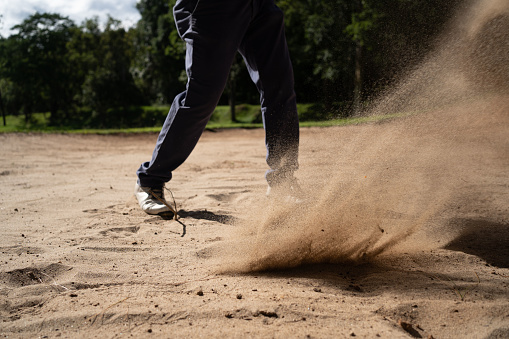Golf Skills: 10 Skills To Improve Your Golf Scores
Posted by
Golf tests a variety of skills.
It is one of the big reasons the game is so enthralling and keeps us returning for more.
Skills can be learned, practiced and mastered by anyone.
But which skills should you focus on?
This article highlights 10 physical and mental skills that you can focus on when you are practicing and playing to reduce your scores.
Ball Striking Golf Skills

When you analyze it, the moment when a club strikes the ball is the essence of golf. To become better at golf you must focus on that moment. Learn to fully develop the necessary package of skills.
First, you have to master the big four: grip, alignment, ball position, and posture. Next, you have to develop the swing motion which is essentially a rotation of the body one way and then the other whilst keeping the club on a good plane. This is a simplification but the best players in the world still review these key elements and practice them regularly usually with a coach or teacher. Using a Skillest coach is one of the best ways of obtaining regular and actionable feedback for your swing to improve ball striking.
Essential Fitness For Golf
Many people forget the importance of fitness. Golf is a sport, after all. If you can’t get your body into the right positions consistently or if you constantly struggle with pain and fatigue on the course, you will never play your best. Having enough strength and flexibility to complete the motion of the golf swing is a skill that no golfer should overlook.
Lag Putting And Holing Out

Better lag putting and holing out can shave shots off the score of any golfer. Lag putting is essentially a test of how good you are at judging pace. Holing out is about how good you are at making the makable putts which tend to be shorter. There are plenty of drills for improving these skills. Practice both far from the hole and from 4ft and in and your putting skills will improve.
Bunker Play – Golf Skills Around The Greens

Nothing seems to invite more fear and dread for the average golfer than going in a bunker. It is not surprising as many golfers have often experienced traumatic times in bunkers early on.
As early as possible in your playing career, learn how to get out of a bunker in one shot every time. This will help you relax when you go into a bunker, reduce the blowups on your scorecard and give you a base from which to refine your bunkers skills over time.
Reading the Golf Course
One thing that all pros do when playing is to read the golf course. They work out where the safe zones are and where to miss. Depending on how you swing and your natural shot shape, you should be able to step up onto any hole and find places that will, in percentage terms, give you the best chance of your best score.
When you are on the golf course, try and put yourself in the designer’s shoes, choose lines and choose clubs that keep you away from trouble. You don’t always have to take on the pin or go for the hero carry! Play with strategy – lay up, leave a yardage you like, leave the ball under the hole and work out the best approach angle. All will pay dividends.
Improving Mental Golf Skills With A Pre-Shot Routine
A pre-shot routine is a great way to develop a simple shot-hitting system that enables you to hit your shots consistently. Do the same set of thought processes and movements before every single shot and you will see an impact.
This is a very easy skill to master – the difficulty comes with developing the mental discipline to do it every time no matter what the situation on the course. During a round, make a mental note of how many shots you hit with a proper pre-shot routine and work on keeping that number high.
The Ability To Improve
Learning things and retaining them is a skill. Learning the right things and then remembering them through recall and practice will make them permanent. A good example in golf is the grip. If you learn how to master how to grip the club from the beginning, remember the key elements and practice, practice, practice then you will not have to spend too much time learning this skill again.
Understand Your Own Tendencies
Occasionally bad shots on the course are inevitable and happen to the best of golfers. An important skill is to be able to forget your bad shots and learn how to reset yourself. Experienced golfers know that they will occasionally hit bad shots. They stick to their routines, knowing that their next shot is more likely to be better.
If you know your own tendencies well, sometimes you can fix your bad shots on the course. Once you have been playing a while you will find that your errors become familiar and your fixes likewise. Make sure you take these onto the course to keep your round on track.
Keep Calm and Carry On

Golf can test the calmest of temperaments. No matter what happens out there, get over it, reset and carry on. The more you react to a bad shot the more likely you are to remember it and play even worse. Don’t let it happen. A good image is a pebble hitting water. The pebble makes ripples but they quickly fade away. This is the way to think about your mental state during the round. Practice this skill by finding a way to move on quickly. The books of Bob Rotella are highly recommended for developing a better mental game. Also, here are the 5 Most Important Mental Skills for Golfers.
Meaningful Practice Of Your Golf Skills
The way you learn and develop the skills in some ways is the most crucial element of all of these. If you learn something in the wrong way and practice it then that fault will become permanent and hard to fix. Learn it right the first time ideally with a qualified teacher, practice it and it becomes a skill that can only improve. Secondly, it is important to make the practice sessions smart. Have specific measurable goals and try to mimic the course conditions when you do practice. With high-quality inputs and outputs along with feedback, your skills will develop indefinitely.
Conclusion
To excel at golf requires you to excel in many different aspects. If you want to improve as quickly as possible, find a coach on Skillest. The best way to learn any new skill is to get practice a lot and to get frequent feedback from a trusted coach. With Skillest, your coach can give you the proper guidance and also monitor your practice sessions so you get the most out of your practice sessions.
